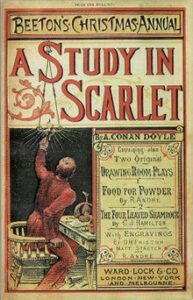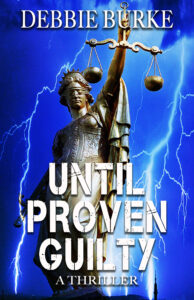
Image credit: Pixabay
By Debbie Burke
Today, let’s welcome another Brave Author with a first page submission that’s described as an adaptation of Sherlock Holmes set in the future. Please enjoy then we’ll discuss.
A Study in Suffering
Ch. 1
“I’m sorry for your loss miss. Very sorry.” But right as the words leave his lip he glances down at his watch. The foot vibrates from his jostling foot.
“How did she die?” The words are strange, foreign. They leave my mouth, but I know they don’t come from me.
His features contort into a twisted pretense of sympathy. “I’m sorry, it’s classified. All you’re permitted to know is that it was an unexpected attack by one of the Betrayers. It’s not my choice, this is all that I know.”
I nod, but after a moment ask “You don’t know which one? Why would that be kept classified?” I’m once again shocked by the numb coldness of my words.
“I’m sorry, but I honestly don’t know. I’m sure you will be told more at a later date. Oh, and i do know that the prime minister will be reaching out to you soon.”
I stare at him.
“Now I truly am sorry miss, but I must go.” He practically runs out the door.
I remain frozen, practically glued to the seat. Then the tears come.
He was supposed to stay for at least a half-hour, but he left halfway through. That’s why it takes fifteen minutes for the secretary to find me, trembling in the chair, tears merging with mascara to create trails of grief running down my face, paper clenched so tightly in my hands that they turn a shade quite similar to it. The paper reads: Valentina Watson, died fighting in combat, 5:55 pm.
My sister is dead
~~~
Let’s dig in. Quotes from the original text are in red. My suggestions are in blue.
The chapter starts with a major upheaval in the life of a character who’s presumably the protagonist. Her sister has been killed in combat and the circumstances of her death are murky. Questions are immediately raised in the reader’s mind. What happened and why is the death is “classified”? Those are excellent hooks with which to begin the story.
However, typos distract from an otherwise promising start.
“I’m sorry for your loss [missing comma] miss. Very sorry.” But right as the words leave his lip [missing s] he glances down at his watch. The foot vibrates from his jostling foot. [this doesn’t make sense.]
…but after a moment ask [missing comma] “You don’t know which one?
“Oh, and i [needs to be capitalized] do know…”
“Now I truly am sorry [missing comma] miss, but I must go.”
My sister is dead [missing period]
Setting: The conversation between the POV character and an unidentified man floats in a vacuum. Is this taking place at her home or work? At military headquarters? Or somewhere else? The reader has no idea.
That’s why it takes the secretary fifteen minutes to find me… This line suggests the location might be a large government office but it’s not clear.
Grounding readers in the fictional world is important. If they have to guess where the action is happening, that not only feels unsettling but also lessens the impact of compelling questions about Valentina Watson’s death. Instead of being pulled into the story, readers are trying to figure out where they are.
This scene is probably crystal clear in the Brave Author’s head but it didn’t quite make the transition from brain to page.
Here’s one possibility to add hints about the place.
“I’m sorry for your loss, miss. Very sorry.” The uniformed soldier sits in a straight-back chair opposite me in a closet-size alcove at the British Embassy. Right as the words leave his lips, he looks down at his watch and crosses his legs. One foot jostles incessantly.
Mood: The characters’ dialogue and actions establish a tense, highly-charged mood for this opening scene. A terrible event deeply affects the POV character yet she is denied answers as to why her sister died. The mention of the prime minister foreshadows a brewing national or international crisis with high-stakes repercussions. Great job!
Character names and functions: First-person POV makes it difficult to introduce the main character’s name without feeling stilted and forced. However, there are a couple of chances to give her name in a natural-sounding way:
“I’m sorry for your loss, Miss Watson. Very sorry.”
Another option is to insert her name in the paper she’s been given: The paper reads: Valentina Watson, died fighting in combat, 5:55 pm. Notify next of kin, XYZ Watson.
Brave Author effectively shows the obvious discomfort of the man who delivers the bad news. I’m guessing he’s probably a walk-on character whose name isn’t important to the story. But identifying his job or function would add valuable background information.
For instance, is he a flunky bureaucrat in a business suit? A doctor or nurse wearing blood-stained scrubs who’s just come from the field hospital where Valentina died? A reluctant grief counselor who’s supposed to stay with the bereaved sister for half an hour but runs out after 15 minutes?
Protagonist’s reaction: Brave Author shows her shock but the phrasing is a bit awkward.
Original: “How did she die?” The words are strange, foreign. They leave my mouth, but I know they don’t come from me.
Suggestion: The words come from my mouth but they sound as if a stranger is speaking.
Original: I’m once again shocked by the numb coldness of my words.
Suggestion: The cold, detached tone of my questions surprises me. How can I sound so calm?
Original: I remain frozen, practically glued to the seat. Then the tears come.
Try to avoid the cliché practically glued to the seat.
Original: “…tears merging with mascara to create trails of grief running down my face…” I like this description a lot because the image nicely combines physical and emotional reactions. However, it’s a minor lapse in POV—she can’t see her own face unless she’s looking in a mirror. Still, I’d keep it because it’s strong and vivid.
Suggestion: My muscles are numb, useless. I can’t rise from the chair. My eyes fill, tears overflowing and merging with mascara to create trails of grief running down my face.
Use the paper clenched in her hand to add more information.
Suggestion: My clenched hand turns the same shade as the crumpled white paper I hold—official Army letterhead that reads Valentina Watson, died fighting in combat, 5:55 pm.
Story questions: The man states: “All you’re permitted to know is that it was an unexpected attack by one of the Betrayers.” This is a great sentence that provokes many questions.
Who has the vast power to decide what information the surviving sister is allowed to know? Why was Valentina in combat? Who are the Betrayers? Why are the details classified? What is Valentina’s importance that causes a prime minister to become involved?
Time: As written now, the encounter between protagonist and the man lasts about 15 seconds rather than 15 minutes. What else happens during the rest of the conversation? Why is it supposed to last a half hour? Is this particular detail about time important? If so, give a hint why.

Photo credit: Wikipedia, First edition 1887
One last observation: The book is described as an adaptation of Sherlock Holmes set in the future. I’m guessing the Watson sisters are descendants of Dr. John Watson? The title A Study in Suffering could be a takeoff on A Study in Scarlet. Making the connection at this early stage is not necessary but the Brave Author will need to address that at a future point.
Overall impression: Brave Author, you quickly establish disturbance, tension, and mystery. The strange circumstances of Valentina’s death are compelling. The unanswered questions make the reader eager to learn more. But this first page is too bare bones. Flesh it out and it will be a good start.
Nice work, Brave Author! Wishing you the best of luck!
~~~
TKZers: What’s your impression of this first page? Would you keep reading? Any ideas for the brave author?
~~~

My new thriller, Until Proven Guilty, raises troubling questions about DNA evidence that’s supposed to show proof but may not.
Available at these online booksellers.
Or ask your favorite independent bookstore to order it.

While this isn’t the type of book that I would reflexively reach for, Debbie, it definitely has some interesting opening hooks.
My advice to the Brave Writer is to start with your excellent suggestions and go from there. I think you hit the high points, for sure.
Thanks, Debbie, and have a great week!
Thanks, Joe. Always glad to see you up early with your savvy comments.
Receiving feedback from different readers with different tastes is really helpful to an author. Each of us sees the story with a unique perspective, adding another layer of meaning.
Hope your week is a good one, too, Joe!
Thank you, Brave Author, for letting us take a peek at your first page. I am intrigued by a Sherlock Holmes story in the future. My favorite line was “I’m sorry, it’s classified” because my interest was piqued. What mission was the dead woman on?
Debbie gave you a wonderful critique, and I don’t disagree with any of it. One trick I use: if you put the manuscript away for a month then pull it out and read it with fresh eyes, you can catch some of your own typos and awkward places. (By awkward I mean, for example, using “practically” two sentences in a row and the “foot” sentence in the first paragraph.) This trick is especially helpful if you read the manuscript out loud or have someone read it to you.
Wishing you the best on your continued writing journey, Brave Author!
Thanks for your excellent suggestions, Priscilla. Reading aloud (or using a text-to-speech program) shows up problems that your eye skips right over on the screen or page. Also, letting a ms. cool off for a time lets you look at it more objectively.
Great critique, Debbie. I agree with all your suggestions.
The beginning creates some confusion, which you have addressed clearly. I am not a fan of present tense, so that adds to my difficulty getting into the story.
Brave author, you have a great concept. I like your description at the end of the first page. Follow Debbie’s suggestions and you will have a good start to your story. Best wishes for this story.
BTW, I think (my opinion) that using text to speech allows you to pick up mistakes you couldn’t “see,” even without setting your manuscript aside while you wait for “fresh eyes.”
Hope you have a wonderful week!
Thanks, Steve.
You’re right about text-to-speech. The computer only reads what’s there, not what your brain imagines is there. That monotone voice has caught many missing and transposed words in my stories.
Excellent suggestions, Debbie. The POV felt too distance. My advice would be to dig deeper into your character. When you open with a traumatic event, emotion should bleed through every word. Her sister’s dead! The military won’t give her any answers for why or how she died. She should be an emotional basket case, fluctuating between anger, grief, and uncertainty. Then show us this scene through the eyes of a grieving sister. Best of luck, Brave Writer!
“…fluctuating between anger, grief, and uncertainty.” Great suggestion, Sue. Her emotions will be the confusing jumble you describe.
Yes, the scene calls for a Save the Cat moment, or making some sort of a connection between MC and the reader. It’s a bit too introspective, as it stands.
Excellent suggestions, Debbie, and great first page author. Like the others, I agree with all of Debbie’s suggestions. I’ll just add a suggestion on setting. I like that she’s ice cold, that’s how I would be too, but she would also be hyperaware of her surroundings. The chair pressing into her back, the overbright lights, or if she’s home, familiar things that look foreign now. She doesn’t have to react to them, but it adds to discomfort.
Azali, good point about setting details that might seem minor, like the chair and lights, but they really paint a picture for the reader. You’re so right about familiar things looking strange during the shock and disorientation of grief.
Thanks for chiming in with more good ideas.
Thank you, Brave Author, for submitting your first page. I love the idea of an adaptation of a Sherlock Holmes story set in the future. If I were you, I’d study Debbie’s excellent critique and go from there.
I liked the tension between the bureaucrat and the grieving sister. I agree with Debbie that you should name the character early on. You may even use the uninformed bureaucrat to add further tension by having the first line say something like:
“I’m sorry for your loss, Miss … um …” He looked down at the paper lying on the desk in front of him. “… Miss Watson.”
And then draw out the scene to fill in the setting and the tension.
Good luck with this!
Great suggestion. Forgetting her name is a nice touch, describes the impersonal, pro forma situation.
“Miss…um…” is a great idea, Kay. Totally captures his cold indifference in the face of life-altering tragedy for the main character.
If this is the future, would she be addressed by an official as “Miss”? It’s sure not that way now.
Who knows what the future will bring? Even Carnac the Magnificent would be stumped these days.
Right. I’d like to see an unusual term of address or some other clue that we’re in the future.
Love the concept, the dramatic situation. The challenge is adhering to The Canon and at the same time, showing us we’re in the future, a future that, very like the present, doesn’t have “watches.” Maybe chronoscopes?
More important might be drawing us further into empathy as soon as possible. Easier said than done, yes. Consider putting the sister’s photo on the paper, not a service ID picture, but one with emotional context, perhaps wearing something personal. Show us the paper early, as Kay suggests.
J, a photo of the sister opens several good possibilities to expand the main character. Emotional context, as you mention.
Also that’s an opportunity to show the sister’s appearance and, by extension, describe the MC. Do they look alike? Or are they totally different–for instance, Valentina could be blond and stocky with a serious demeanor, in contrast to XYZ with dark curls, slim, and cheerful…or at least she was until her sister was killed.
Thanks for an excellent idea with lots of potential.
I’m getting to TKZ late this evening but thanks, Brave Author, for your submission.
I concur with Debbie’s assessment. I will add that when I read the opening sentence, perhaps because I’m reading this first page at TKZ, I thought the opening line was going to be from a PI who was interviewing someone whose loved one was killed. Of course in the next few sentences you realize this is not the case, but it did throw me off temporarily. Also as noted, “The foot vibrates from his jostling foot.” was quite distracting because I was trying to figure out what was really meant.
One of the first things I look for when I read is a sense of time & place & I did not come away from this first page read with any sense of either of these things. I want to be sympathetic to the protag in their loss, but without a sense of time & place to ground me, I found it a bit difficult. But with revision, you will have an intriguing hook with this situation.
You’re never late at TKZ, BK. Always glad to see you.
“Without a sense of time and place to ground me.” That was my concern, too. Establishing those details only takes a few words and will work wonders to pull readers into a story and engage their sympathy.
Author here, I’d like to thank everyone so much for all their wonderful advice.This has been so much help. One thing I’d like to clarify: I meant to say “The floor vibrates from his jostling foot.” I can’t believe I missed that. Reading this feedback was very nerve racking, as I’m a very young, inexperienced writer who isn’t very good with criticism, but also exciting because it shows me how much untapped potential there is and gives me hope that I could twist my jumble of 50,000 words from nanowrimo into something truly clear and engaging. Ugh, there’s so much editing ahead! Anyways, thank you all so much.
Hi Aurora!
Thanks for coming forward. You say you’re a “very young, inexperienced writer.” You’re courageous to submit your piece to anonymous strangers! This is an important step in gaining experience and improving your craft. Congratulations!
As you can see from the comments, you captured reader interest with a compelling, dramatic situation that has lots of potential to be a great story.
If you completed the 50K Nanowrimo challenge, you’re already well on your way. Many writers start novels but never finish. You did–well done!
You created the skeleton of the book and now you can layer on the flesh with character development and sensory details to bring the story to vivid life My first drafts are also bare bones with many parts that need filling in so I understand that way of working.
Some writers think rewriting is drudgery. But it’s truly rewarding when you see the story improve with each subsequent draft.
Again, congratulations! You’ve got the right stuff to build this story into a gripping book. Do keep us posted on your progress. Thanks for submitting!